七年级下册英语第11单元课件复习过程
合集下载
人教版英语 七下 Unit11 全单元 复习课件(共32张PPT)

Ⅴ.短文写作
注意:时态
My Dragon Boat Festival was so great. We had so much fun. In the morning, I made zongzi with my mother. After that, I ate zongzi with my brother. It was so delicious. My father watched the boat races on TV. They were so exciting. In the afternoon, I visited my grandparents and I took a lot of great photos. All in all, it was an interesting day.
+5
语法探究:一般过去时态
定义: 表示___过__去_____某个时间或某一段时
间内发生的动作或存在的状态。 时间状语: ___y_e__s_t_e_r_d_a__y_ (昨天),
_la_s__t_y_e__a_r_(去年), __la__s_t_w__e__e_k__ (上周) _th__r_e_e__d_a__y_s__ago (三天前)等。
3.农民 __f_a_r_m__e_r__ 11.油画___p_a_i_n_t_in_g
4.极好的_e_x__c_e_ll_e_n_t 12.令人激动的_e_x__c_it_i_n_g_ 5.乡村_c_o_u_n__tr_y__si_de 13.可爱的__lo_v__e_ly_ 6.昨天_y_e_s_t_e_r_d_a_y_ 14.便宜的 c_h_e_a_p___ 7.担心___w_o_r_r_y___ 15.缓慢的 s_l_o_w____ 8.幸运地__lu_c_k__il_y____ 16.礼物_g__if_t____
英语七年级下册Unit11-单元总复习课件(新人教版) PPT

词汇训练营
单词填空,考查综合运用能力!
二、根据提示填空。 1. He has two cups of __m_i_l_k__(牛奶)every day. 2. Is there a_n_y_th_i_n_g__ wrong with your bike? 3. Mary is never late for school. She is an e_x_ce_l_le_n_t_ girl. 4. Tom got up late. _L__u_c_k_il_y_(luck), the bus was also late. 5. The pen is too e_x_p_e_n_si_v_e_. I don’t have enough money. 6. The film is very _e_x_c_i_ti_n_g_(excite). We all like it.
句型大闯关
本单元重点句子有哪些?看谁说得多!
5. All in all, it was an exciting day. 总之,这是令人兴奋的一天。
all in all 相当于汉语中的“总的说来;总之;整体上说” ,用来对所阐述的内容进行概括性总结及归纳。
6. Everything was about robots and I’m not interested in that. 每个东西都是关于机器人的,我对此不感兴趣。
A.That sounds great
B.It was great
C.Fine, thanks
D.Sure
语法加油站
语法加油站
总结本单元的语法知识,你掌握了吗
一般过去时态(1)
定义:表示过去某一时间所发生的动作或存在的状态。 谓语动词:要用一般过去式。 时间标志:yesterday, last week, last month(上个月), last year(去年), two months ago(两个月前), the day before yesterday(前天),in 1990 (在1990年), in those days (在那 些日子里)等表示过去的时间状语。 如: I was born in 1990. (我出生在1990年)。 I went to the park last week. (我上周去的公园)
人教版英语七年级下册 Unit 11 单元巩固与复习 (共28张PPT)

It is very kind of you to help me.
你能帮助我真是太好了。 It is important for us to learn English well.
对我们来说,学好英语很重要。
4. What did the farmer say? 本句是一般过去时的特殊疑问句, 句子的结构是“特殊疑问词+ did + 主语+谓语+其它?”。 特殊疑问词可以根据实际情况选择需要的词, 例如对地点提问用where,对时间提问用when等。 助动词did后面的谓语动词要用原形, did没有人称和数的使用限制。 回答时,要根据问句回答具体的内容。
第二章
词组巩固
学 习 汇 报 ·知 识 书 籍 ·主 题
学校旅行 去散步 挤牛奶 骑马 喂鸡 与农民交谈 照相 问一些问题
school trip go for a walk milk a cow ride a horse feed chickens talk with a farmer take some photos ask some questions
How do you do? 你好! How do you do? 你好! 4)How is it going?/ How is everything going? 用来询问事情进展如何。 例如: How is it going? 情况/进展如何? Very well./ Not too bad./just so so. 很好。/还不坏。/一般吧。
cow [kaʊ] n. 奶牛,母牛;母兽 farmer ['fɑː(r)mə(r)] n.农民;农场主 horse [hɔː(r)s] n. 马 countryside ['kʌntrɪsaɪd]n.乡村;农村 flower ['flaʊə(r)] n.花 sun [sʌn] n.太阳 museum [mjuː'ziəm] n.博物馆 painting ['peɪntɪŋ] n.油画;绘画
你能帮助我真是太好了。 It is important for us to learn English well.
对我们来说,学好英语很重要。
4. What did the farmer say? 本句是一般过去时的特殊疑问句, 句子的结构是“特殊疑问词+ did + 主语+谓语+其它?”。 特殊疑问词可以根据实际情况选择需要的词, 例如对地点提问用where,对时间提问用when等。 助动词did后面的谓语动词要用原形, did没有人称和数的使用限制。 回答时,要根据问句回答具体的内容。
第二章
词组巩固
学 习 汇 报 ·知 识 书 籍 ·主 题
学校旅行 去散步 挤牛奶 骑马 喂鸡 与农民交谈 照相 问一些问题
school trip go for a walk milk a cow ride a horse feed chickens talk with a farmer take some photos ask some questions
How do you do? 你好! How do you do? 你好! 4)How is it going?/ How is everything going? 用来询问事情进展如何。 例如: How is it going? 情况/进展如何? Very well./ Not too bad./just so so. 很好。/还不坏。/一般吧。
cow [kaʊ] n. 奶牛,母牛;母兽 farmer ['fɑː(r)mə(r)] n.农民;农场主 horse [hɔː(r)s] n. 马 countryside ['kʌntrɪsaɪd]n.乡村;农村 flower ['flaʊə(r)] n.花 sun [sʌn] n.太阳 museum [mjuː'ziəm] n.博物馆 painting ['peɪntɪŋ] n.油画;绘画
Unit 11 单元知识点复习课件 人教版七年级英语下册

walk作动词,“走路;散步”,后接地点名 词时,要加上介词to,其后接here,there,home 等地点副词时,不加介词to。
Your home is near the school, so you can walk home. We walk to school every day.
2. milked a cow 给奶牛挤奶 ✓ milk 在此处作动词,意为“挤奶”。
令人兴奋的; 我看了一场令人兴奋的足球赛。
excgitin
令人激动的。 修饰物;作
I
watched
an
exciting
football
定语或表语。 game.
感到兴奋的; 听到这个好消息,我们都很兴奋。
excited
感到激动的。 修饰人;作
We
were
all
exБайду номын сангаасited
after
hearing
表语。
I don’t know _h_o_w__t_o_s_p_e_l_l _ the word.
✓ 特殊疑问词+不定式结构可改写成由该疑问词引 导的宾语从句,改写时在疑问词后加主语(与 主句主语一致),将不定式改成“should+动词 原形”作谓语。
You have to consider what to do next. =You have to consider what you should do next.
the great news.
练一练
I’m ________ about the ________ football
match.
A. exciting; excited
B. excited;
七年级英语下册Unit11Howwasyourschooltrip知识回顾课件新版人教新目标版
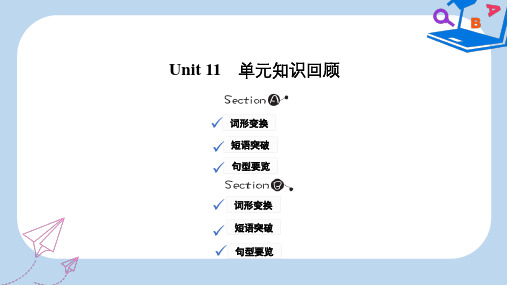
5.hear→______(过去式)
heard
短语突破
1.消防站 ___________ 2.总的来说 _fi_r_e__s_ta_t_io_n__
3.对……感兴趣al_l __in___a_ll__________
be interested in
句型要览
1.导游教我们怎样制作机器人模型。
The guide taught us ___h_o_w____t_o____m_aakemodal robot. 2.总之,这是令人兴奋的一天。
二、听思路。
思路就是我们思考问题的步骤。例如老师在讲解一道数学题时,首先思考应该从什么地方下手,然后在思考用什么方法,通过什么样的过程来进行解 答。听课时关键应该弄清楚老师讲解问题的思路。
三、听问题。
对于自己预习中不懂的内容,上课时要重点把握。在听讲中要特别注意老师和课本中是怎么解释的。如果老师在讲课中一带而过,并没有详细解答, 大家要及时地把它们记下来,下课再向老师请教。
四、听方法。
在课堂上不仅要听老师讲课的结论而且要认真关注老师分析、解决问题的方法。比如上语文课学习汉字,一般都是遵循着“形”、“音”、“义”的 研究方向;分析小说,一般都是从人物、环境、情节三个要素入手;写记叙文,则要从时间、地点、人物和事情发生的起因、经过、结果六个方面进行 叙述。这些都是语文学习中的一些具体方法。其他的科目也有适用的学习方法,如解数学题时,会用到反正法;换元法;待定系数法;配方法;消元法; 因式分解法等,掌握各个科目的方法是大家应该学习的核心所在。
Unit 11 单元知识回顾
词形变换 短语突破 句型要览
词形变换 短语突破 句型要览
Unit 11 单元知识回顾
人教版七年级下册unit 11复习(PPT28张)
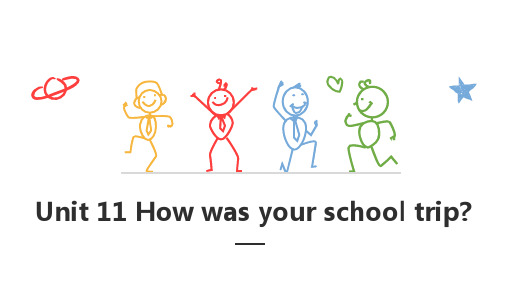
yesterday last …
in+过去的时间
two weeks/months/years ago a few days ago a long time ago How long ago… 多久以前…
yesterday evening/ morning/ afternoon
(拓)the day before yesterday
30 总而言之 all in all
31 根本不 not...at all
Phrases
32 黑暗的
be dark
33 在慢车上 on the slow train
34 很快到那里
get there so fast
Thank you!
→(地道表述)Tom was single.
句式变换
1. Ne Zha was a naughty boy. 2. Ne Zha was not a naughty boy. 3. -Was Ne Zha a naughty boy?
-Yes, he was./ No, he wasn’t. 4. Who was Ne Zha?
Phrases (P206)
Phrases
01 去散步
go for a walk
02 给奶牛挤奶 milk a cow 03 骑马 ride a horse 04 喂鸡 feed chickens
Phrases
05 与一位农民谈话 talk with/ to a farmer
06 看到许多花 see a lot of flowers learn a lot about farming
Phrasesຫໍສະໝຸດ make a model robot 17 制作一个机器人模型
in+过去的时间
two weeks/months/years ago a few days ago a long time ago How long ago… 多久以前…
yesterday evening/ morning/ afternoon
(拓)the day before yesterday
30 总而言之 all in all
31 根本不 not...at all
Phrases
32 黑暗的
be dark
33 在慢车上 on the slow train
34 很快到那里
get there so fast
Thank you!
→(地道表述)Tom was single.
句式变换
1. Ne Zha was a naughty boy. 2. Ne Zha was not a naughty boy. 3. -Was Ne Zha a naughty boy?
-Yes, he was./ No, he wasn’t. 4. Who was Ne Zha?
Phrases (P206)
Phrases
01 去散步
go for a walk
02 给奶牛挤奶 milk a cow 03 骑马 ride a horse 04 喂鸡 feed chickens
Phrases
05 与一位农民谈话 talk with/ to a farmer
06 看到许多花 see a lot of flowers learn a lot about farming
Phrasesຫໍສະໝຸດ make a model robot 17 制作一个机器人模型
人教版七年级下册英语:Unit_11复习课件(全面)总结
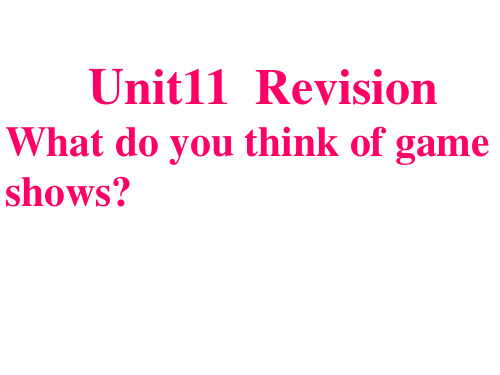
______ _____ ______after supper is good for______. think of What 4、他们对每样东西的看法如何?
____did they _____ _______everything?
5、他们中的一些答案使我们大感意外。 Some _____their answers ___________ us. surprised _______ of 6、我家乡的每个人都很友好。 friendly ______ in my hometown ______very _______. Everyone is 7、我们喜欢在课堂上用英语问问题。 asking ________ ________ ________in We enjoy_________questions with r in next month’s magazine 把你的信放到下个月的杂志里 28. wear colorful clothes 穿着五颜六色的衣服
Ⅱ、Sentences:
1.你觉得肥皂剧怎么样?
What do you think of soap operas? 我不能忍受它们。I can’t stand them .
e.g. Do you mind if I smoke here? 我如果在这里抽烟你介意吗? He doesn't mind hard work. 他不介意艰辛的工作。 Do you mind opening the window? 你介意把窗户打开吗?
根据汉语,补全英语句子。 1、“你觉得游戏节目怎样?”“我忍受不了那些东 think of 西。” What "______do you________ _______game shows?“ “ I can’t stand _______ _____them. " a five-year-old 2、那是个仅5岁的男孩,但他会写字、会看书。 read That is only____ ___ _____ boy, but he can write and _____. Taking a walk 3、晚饭后散步对健康有益。 health
新目标(人教)七年级下册英语单元复习课件 Unit 11 复习课件

Did you learn anything?你学到什么东西了吗?
anything是不定代词,意为“任何东西;任何事物”,常用于否定句
或疑问句中。 【拓展延伸】 ①something常用于肯定句中,在表示委婉的邀请、建议或希望得 到肯定回答或认可的问句中,一般也用something而不用anything。 Could you please give me something to eat?请你给我一些吃的东西 好吗?
feed chickens
talk with a farmer
6.拍照 _t_a_k_e__s_o__m__e__p_h_o__t_o_s_/_p_i_c_t_u_r_e_s___
7.种苹果 8.看星星
____g__r__o____w____a__p____p__l__e__s____________________
gift shop
all in all
25.对……感兴趣 __b__e__in__te__re__s_t_e_d_________ 26.一点也不;根本不 ________________________ 27.令人兴奋的一天 ____n_o__t_.._.a_t__a_l_l __________ 28.太多人 ________________________
91.0摘.去草钓莓鱼____w____a__t__c__h____t__h___e____s__t_a___r_s______________
pick strawberries
go fishing
11.很有意思 ___s_o__m__u_c_h__f_u_n_________ 12.许多 ________________________ 13.爬山 ___q_u__it_e__a__lo__t_(_o_f_)_______ 1145..出在来乡;下c出 ;lim现 在b农_t_村h__e__m_____o___u__n___t__a__i_n___s_____________________
unit 11【复习课件】七年级英语下册单元复习(人教版)

2. —____H__o_w_ ____w__a_s_ ____yo_u__r_ ___t_r_ip___ last week?
你上周的旅行怎么样?
—___I_t_____ __w_a_s_____ex_c_e_l_le_n_t___.
棒极了。
重点句子
3. —_____D_i_d_ ____y_o_u__ _____g_o__ to the zoo?
5. pick v. 采; 摘→ ___p_i_ck__u_p____拾起; 捡起; 收拾 6. countryside n. 乡村; 农村→ ___v_il_la_g_e__ (近义词) 7. milk v. 挤奶→ ___m_i_lk_e_d__ (过去式) 8. cow n. 奶牛→ ____m__an_y__c_o_w_s______许多奶牛 9. farmer n. 农民; 农场主
27. fire n. 火; 火灾→ __fi_r_e_s_ta_t_i_o_n____消防站 → ____m__a_k_e_a_f_i_re____生火
28. museum n. 博物馆→ a_r_t_/h_i_s_to_r_y__m_u_s_e_u_m__美术/ 历史博物馆 29. gift n. 礼物; 赠品→ __p_r_e_s_en__t ___(同义词) 30. interested adj. 感兴趣的→ __i_n_t_e_re_s_t___ n. 兴趣
奋的
24. expensive adj. 昂贵的→ ____ch__ea_p____(反义词) → ____d_e_a_r____(同义词)
25. cheap adj. 廉价的; 便宜的→ __e_x_p_e_n_s_iv_e__(反义词)
重点单词
你上周的旅行怎么样?
—___I_t_____ __w_a_s_____ex_c_e_l_le_n_t___.
棒极了。
重点句子
3. —_____D_i_d_ ____y_o_u__ _____g_o__ to the zoo?
5. pick v. 采; 摘→ ___p_i_ck__u_p____拾起; 捡起; 收拾 6. countryside n. 乡村; 农村→ ___v_il_la_g_e__ (近义词) 7. milk v. 挤奶→ ___m_i_lk_e_d__ (过去式) 8. cow n. 奶牛→ ____m__an_y__c_o_w_s______许多奶牛 9. farmer n. 农民; 农场主
27. fire n. 火; 火灾→ __fi_r_e_s_ta_t_i_o_n____消防站 → ____m__a_k_e_a_f_i_re____生火
28. museum n. 博物馆→ a_r_t_/h_i_s_to_r_y__m_u_s_e_u_m__美术/ 历史博物馆 29. gift n. 礼物; 赠品→ __p_r_e_s_en__t ___(同义词) 30. interested adj. 感兴趣的→ __i_n_t_e_re_s_t___ n. 兴趣
奋的
24. expensive adj. 昂贵的→ ____ch__ea_p____(反义词) → ____d_e_a_r____(同义词)
25. cheap adj. 廉价的; 便宜的→ __e_x_p_e_n_s_iv_e__(反义词)
重点单词
新目标七年级英语下Unit11复习课件(共18张PPT)

说明: 1、清念 /t/ ,即 ed 在清辅音后面念 /t/ ,例:finished helped
passed cooked 2、元浊 /d/ ,即 ed 在元音,浊辅音后面念 /d/ ,
例:borrowed enjoyed called moved
3、/t/ /d/ 之后念 /id/ , 即 ed 在 /t/ /d/ 音后面念 /id/ 例:wanted shouted needed counte1d2
yesterday
last night
in 1990
two days ago
9
动词过去式 的构成
规则动词 不规则动词
构成 读音
10
规则动词过去式的构成
构成规则
例词
1、一般在动词原形末尾加– ed 2、结尾是 e 的动词加 -- d
look play start live hope use
looked played started lived hoped used
3、末尾只有一个辅音字母的 重读闭音节词,先双写这 个辅音字母,再加—ed
stop stopped plan planned trip tripped
4、结尾是“辅音字母+y”的动
study studied
词,先变“y”为“i”再加—ed carry carried
11
规则动词词-ed的读音
清念 /t/ ,元浊/d/ ; /t/ /d/ 之后念/id/
Infinitive am /is are have/has know feel build buy can
不规则动词表
Past tense was were had knew felt built bought could
passed cooked 2、元浊 /d/ ,即 ed 在元音,浊辅音后面念 /d/ ,
例:borrowed enjoyed called moved
3、/t/ /d/ 之后念 /id/ , 即 ed 在 /t/ /d/ 音后面念 /id/ 例:wanted shouted needed counte1d2
yesterday
last night
in 1990
two days ago
9
动词过去式 的构成
规则动词 不规则动词
构成 读音
10
规则动词过去式的构成
构成规则
例词
1、一般在动词原形末尾加– ed 2、结尾是 e 的动词加 -- d
look play start live hope use
looked played started lived hoped used
3、末尾只有一个辅音字母的 重读闭音节词,先双写这 个辅音字母,再加—ed
stop stopped plan planned trip tripped
4、结尾是“辅音字母+y”的动
study studied
词,先变“y”为“i”再加—ed carry carried
11
规则动词词-ed的读音
清念 /t/ ,元浊/d/ ; /t/ /d/ 之后念/id/
Infinitive am /is are have/has know feel build buy can
不规则动词表
Past tense was were had knew felt built bought could
英语七年级下册Unit11-单元总复习课件(新人教版)

A.That sounds great
B.It was great
C.Fine, thanks
D.Sure
语法加油站
语法加油站
总结本单元的语法知识,你掌握了吗
一般过去时态(1)
定义:表示过去某一时间所发生的动作或存在的状态。 谓语动词:要用一般过去式。 时间标志:yesterday, last week, last month(上个月), last year(去年), two months ago(两个月前), the day before yesterday(前天),in 1990 (在1990年), in those days (在那 些日子里)等表示过去的时间状语。 如: I was born in 1990. (我出生在1990年)。 I went to the park last week. (我上周去的公园)
all in all 相当于汉语中的“总的说来;总之;整体上说” ,用来对所阐述的内容进行概括性总结及归纳。
6. Everything was about robots and I’m not interested in that. 每个东西都是关于机器人的,我对此不感兴趣。
everything为不定代词,“所有事物,一切”,作主语时 ,谓语动词用单数。 be interested in “对……感兴趣”,主语是人;interesting 修饰物。
句型大闯关
本单元重点句子有哪些?看谁说得多!
7. I didn’t like the trip at all. 我一点都不喜欢这次行程。
not at all / not… at all 意思是“根本不;完全不”。
7. The number of candles is the person’s age. 蜡烛的数量就是过生日的人的年龄。
Unit+11+单元复习+课件++2022-2023学年人教版七年级英语下册

3. 和一般现在时一样,一般过去时中动词be在构成疑问句时, 把 were或was放在主语前面,句尾加问号; 构成否定句时, 在was 或were 后面加 not; 肯定回答和否定回答时 are at school every day. (一般现在时) You were at school yesterday. (一般过去时)
【习作在线】 请根据下表提示, 以“A Great School Trip”为题写一篇
英语短文, 介绍七年级一班去泰山(Mount Tai)校游的情况。
成员
七年级一班的全体师生
活动项目及要求
游览泰山、画画、拍照; 自带水 和食物
出发时间
周六早7点
集合地点
公共汽车站
交通方式及旅途 时间
公共汽车(3小时)
5 动词的不规则变化: go—went have—had see—saw eat—ate buy—bought take—took win—won hang—hung
一般过去时的用法
1. 在一般过去时中,be动词 am 和 is要改为was,are改为 were;
2.特征词:yesterday,last night/week/ time..., … days ago,on Sunday morning…
8. 总的说来,这是令人兴奋的一天。
_ _ _ _A_ _ll_ _i_n_ _a_ _ll_,_ _it_ _w_ _a_ _s_ _a_n_ _e_ _x_c_ i_t_i_n_ _g_ _d_ a_ _y_._ _ _ _ _ _ _ _
9. 每件东西都是关于机器人的,并且我对那不感兴趣。
___________________________________________________
【习作在线】 请根据下表提示, 以“A Great School Trip”为题写一篇
英语短文, 介绍七年级一班去泰山(Mount Tai)校游的情况。
成员
七年级一班的全体师生
活动项目及要求
游览泰山、画画、拍照; 自带水 和食物
出发时间
周六早7点
集合地点
公共汽车站
交通方式及旅途 时间
公共汽车(3小时)
5 动词的不规则变化: go—went have—had see—saw eat—ate buy—bought take—took win—won hang—hung
一般过去时的用法
1. 在一般过去时中,be动词 am 和 is要改为was,are改为 were;
2.特征词:yesterday,last night/week/ time..., … days ago,on Sunday morning…
8. 总的说来,这是令人兴奋的一天。
_ _ _ _A_ _ll_ _i_n_ _a_ _ll_,_ _it_ _w_ _a_ _s_ _a_n_ _e_ _x_c_ i_t_i_n_ _g_ _d_ a_ _y_._ _ _ _ _ _ _ _
9. 每件东西都是关于机器人的,并且我对那不感兴趣。
___________________________________________________
人教版七年级下册unit11复习

人教版七年级下册unit 11复习(PPT28张)
send-sent
spend-spent
人教版七年级下册unit 11复习(PPT28张)
一般过去时 常见标志词
…ago ……以前
yesterday last …
in+过去的时间
人教版七年级下册unit 11复习(PPT28张)
two weeks/months/years ago a few days ago a long time ago How long ago… 多久以前…
3、变aught/ought:
catch-caught teach-taught think-thought bring-brought
人教版七年级下册unit 11复习(PPT28张)
ቤተ መጻሕፍቲ ባይዱ
buy-bought
人教版七年级下册unit 11复习(PPT28张)
不规则动词的过去式 部分记忆规律
4、遇i变a:
yesterday evening/ morning/ afternoon
(拓)the day before yesterday
the week before last
last night
last week
last month
last year
in 1990 in the 18th century
➢ She was here a minute ago.
规则动词过去式的变化规则
1 一般情况→直接加-ed want-_w__a_n_te_d__ play- __p_la_y_e_d__
2 结尾:不发音字母e →直接加-d like-_l_ik_e_d____ hope- __h_o_p_e_d__
send-sent
spend-spent
人教版七年级下册unit 11复习(PPT28张)
一般过去时 常见标志词
…ago ……以前
yesterday last …
in+过去的时间
人教版七年级下册unit 11复习(PPT28张)
two weeks/months/years ago a few days ago a long time ago How long ago… 多久以前…
3、变aught/ought:
catch-caught teach-taught think-thought bring-brought
人教版七年级下册unit 11复习(PPT28张)
ቤተ መጻሕፍቲ ባይዱ
buy-bought
人教版七年级下册unit 11复习(PPT28张)
不规则动词的过去式 部分记忆规律
4、遇i变a:
yesterday evening/ morning/ afternoon
(拓)the day before yesterday
the week before last
last night
last week
last month
last year
in 1990 in the 18th century
➢ She was here a minute ago.
规则动词过去式的变化规则
1 一般情况→直接加-ed want-_w__a_n_te_d__ play- __p_la_y_e_d__
2 结尾:不发音字母e →直接加-d like-_l_ik_e_d____ hope- __h_o_p_e_d__
人教版七年级下册英语:Unit_11复习课件(全面)总结

8.她的朋友杰夫说他不能忍受围巾。
Her friend Jeff says he can’t stand the scarf.
9.我无法忍受说老年人不能美丽的观念。
I can’t stand the idea that old people can’t be beautiful.
10.我喜欢(听)关于(赞扬)我相貌的好话。
20. key ring 钥匙链 21. this week 这周
22. ask sb. about sth. 问某人关于某 方面的事 23. show sb. sth. 给某人展示某物 24. mind the watch 反感手表 25. enjoy doing sth. 喜欢做某事
26. in the school magazine 在校园杂 志上
What’s up?
14.我也不;我也如此(不……)
I don't, either.
本单元重点是掌握“What do you think of …”的
用法,能够简单表达对某物/某事的看法。
(p65)What do you think of…?表示“你认为…怎
么样?”主要用语询问对方对某物/某事的看法。
I enjoy nice words about my looks.
11.我不介意年轻人怎么想(看)我。
I don’t mind what young people think of me!
12.你喜欢哪种电视节目?
What kind of TV show do you like?
13.怎么了;发生什么事了?
(p67,4)agree with sb意为“同意某人的意见、主意 或所说的事”,with后常接表示人的名词。I agree
Her friend Jeff says he can’t stand the scarf.
9.我无法忍受说老年人不能美丽的观念。
I can’t stand the idea that old people can’t be beautiful.
10.我喜欢(听)关于(赞扬)我相貌的好话。
20. key ring 钥匙链 21. this week 这周
22. ask sb. about sth. 问某人关于某 方面的事 23. show sb. sth. 给某人展示某物 24. mind the watch 反感手表 25. enjoy doing sth. 喜欢做某事
26. in the school magazine 在校园杂 志上
What’s up?
14.我也不;我也如此(不……)
I don't, either.
本单元重点是掌握“What do you think of …”的
用法,能够简单表达对某物/某事的看法。
(p65)What do you think of…?表示“你认为…怎
么样?”主要用语询问对方对某物/某事的看法。
I enjoy nice words about my looks.
11.我不介意年轻人怎么想(看)我。
I don’t mind what young people think of me!
12.你喜欢哪种电视节目?
What kind of TV show do you like?
13.怎么了;发生什么事了?
(p67,4)agree with sb意为“同意某人的意见、主意 或所说的事”,with后常接表示人的名词。I agree
初中英语 人教版七年级下册11单元复习课件unit11重点知识课件(共10张)
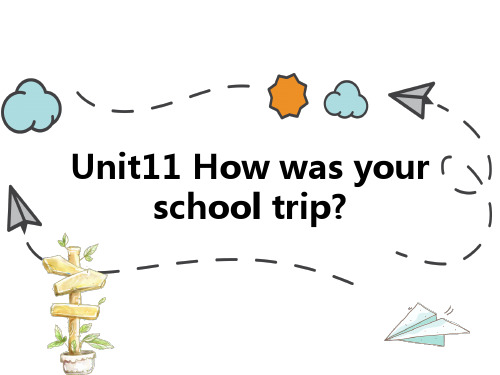
1. school trip
学校旅行
2. go for a walk
去散步
3. milk a cow
挤牛奶
4. ride a horse
骑马
5. feed chickens
喂鸡
6. talk with a farmer 与农民交谈
7. take some photos
照相
8. ask some questions 问一些问题
画画
23. go on a school trip
去旅行
24 visit the science museum
参观科技博物馆
25. how to make a model robot
如制作机器人模型
26.how to do sth
怎么做某事
27. gift shop
礼品店
28. buy sth for sb. 为某人买某物
9. grow apples
种苹果
10. show sb. around
带某人逛某地
11. learn a lot
学到许多
12. pick some strawberries 摘草莓
13. last week
上周
14 in the countryside
在乡村
15. visit my grandparents 拜访我的祖父母
Unit11 How was your school trip?
重点语法:
结构:主语 + 谓语动词的过去式 + 宾语 谈论过去发生的事情用一般过去时态
do/does 的一般过去时态形式:did 例句:Last week I visited my aunt's house.
山东2020--2021学年七年级下学期英语Unit11 复习课件
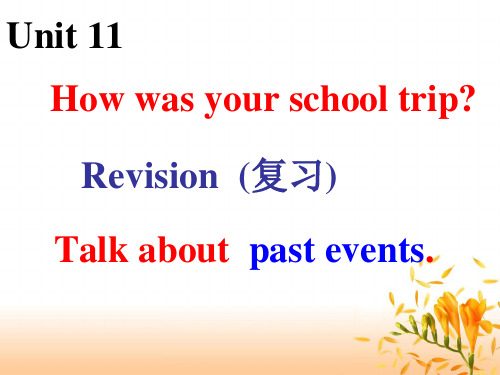
ride a horse feed chickens do homework go to a farm pick strawberries milk a cow take photos
一般过去时
知识结构
构成 一般过去时 用法
常用时间
动词的过去式
1. 表示过去某个时间发 生的动作或存在的状态。 2. 表示过去经常或 反复发生的动作。
The farmer w__a_s(be) nice. He was veryf_r_ie_n_d__lyands_h_o_w__edus around the farm. We s_a_w_(see) a lot of i_n_t_e_r_e_s_ti_n_g_ things and l_e_a_r_n_e_d_ (learn) a lot from _h_im_(he) aboufta_r_m__in(fgarm). Ia_s_k_e_d(ask) him _s_o_m__e_ (any) questions. I asked him _i_f_(是否) they g_r_e_w_ strawberries.
一般过去时的句式结构: 3.一:般疑问句
①Was/Were +主语+其他?
Was he at school last Monday?
肯定回答:Yes,he_w__a_s__. No, he w__a_s__n_’_t.
Were the apples delicious?
Yes, they _w_e__r_e_. No, they _w_e__re__n_’.t
② Did+主语+行为动词的_原___形__+其他?
Did he go to the mountains yesterday?
- 1、下载文档前请自行甄别文档内容的完整性,平台不提供额外的编辑、内容补充、找答案等附加服务。
- 2、"仅部分预览"的文档,不可在线预览部分如存在完整性等问题,可反馈申请退款(可完整预览的文档不适用该条件!)。
- 3、如文档侵犯您的权益,请联系客服反馈,我们会尽快为您处理(人工客服工作时间:9:00-18:30)。
巧记一般过去时
动词一般过去时,表示过去发生事; be用was或用were, have, has变had; 谓语动词过去式,过去时间坐标志; 一般动词加-ed,若是特殊得硬记。 否定句很简单,主语之后didn’t添; 疑问句也不难,did放在主语前; 如果谓语之前有did,谓语动词需还原; 动词若是was,were,否定就把not添。
1a Match the phrases with the pictures.
went for a walk e milked a cow b rode a horse a fed chickens c talked with a farmer f took some photos d
1b Listen and circle the three things Carol did on her school trip in 1a.
What did they d__o_ last weekend? Theyp_i_c_k_e_d_s_o_m__e_s_tr_a_w__b_e_r_r_ie_s_. Howw_e_r_e_ the strawberries? They were delicious.
What did you do last month? I w_e_n_t_ to the countryside. How _w_a_s_ the countryside? It was beautiful. _D_i_d_ you go to the zoo? No, I didn’t.
陈述句:He was at home yesterday.
否定句:He wasn’t at home yesterday.
疑问句:Was he at home yesterday?
Yes, he was./No, he wasn’t.
陈述句:主语+动词过去式+其它 I go to the movie. →I went to the movie. 否定句:主语+助动词didn’t+动词原形+其它 I don’t go to school today. →I didn’t go to school. 一般疑问句:Did +主语+动词原形+其它? Do you have breakfast? →Did you have breakfast? Yes, I do./No, I don’t. Yes, I did./No, I didn’t.
七年级下册英语第11单元课件
What did you do yesterday ? I fed chickens.
feed chickens fed chickens
What did you do yesterday ? I ….
go for a walk went for a walk
What …?
一般过去时
知识结构
构成 一般过去时 用法
常用时间
动词的过去式
1. 表示过去某个时间发 生的动作或存在的状态。 2. 表示过去经常或 反复发生的动作。
yesterday last night/week/ time.. … days ago On Sunday morning
am(is) →was
are →were
stop
个辅音字母,再加-ed
trip
结尾是“辅音字母+y”的动 词,先变“y”为“ i”再加-
study
worry
过去式 worked played hoped
lived
stopped tripped
studied worried
写出下列动词的过去式, 找出规则动词过 去式的构成。
不规则动词
规则动词
I….
talk with a farmer talked with a farmer
…?
….
take some photos took some photos
What did you do yesterday ? I milked a cow.
Did you milk a cow? Yes , I did.
go ride do is are have eat buy see
went rode did was were had ate bought saw
pick visit watch climb study worry play live stop
picked visited watched climbed studied worried played lived stopped
No, I didn’t . But I went for a walk.
milk a cow
挤奶
milked aThey/Carol …. Did ….? Yes, … No,….
fed chickens talked with a farmer took some photos
went for a walk
milked a cow
rode a horse
fed chickens
talked with a farmer took some photos
A: What _d_id_ you do yesterday?
B: I _w_e_n_t_ to the movie.
A: What _d_id_ you do last weekend?
B: I d__id_ my homework.
What did you _d_o_ last weekend? We _v_is_i_te_d__th__e_f_ir_e_s_t_a_t_io_n_._ How w__a_s your trip last weekend? It was boring.
How was your trip? It was great.
What…? I/He/She/They/Carol ….
Did ….? Yes, …
No,…
How… It …
规则动词过去式的构成
构成规则
原形
一般在动词原形末尾加-ed work play
结尾是e的动词加-d
hope live
末尾只有一个辅音字母的 重读闭音节词,先双写这
